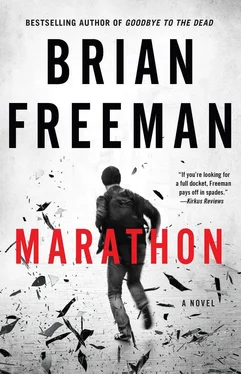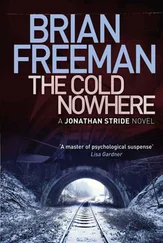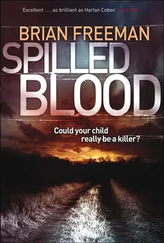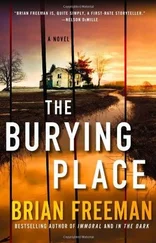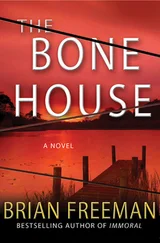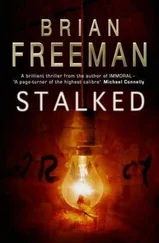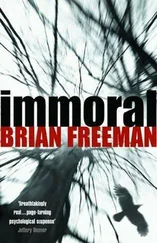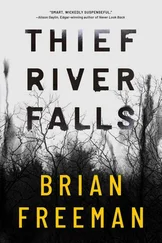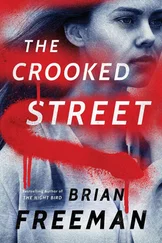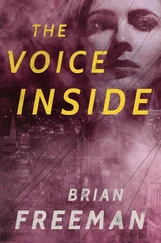“So why didn’t you? Because you thought I didn’t want you to go?”
“No.” The girl smirked. “You know that wouldn’t have stopped me.”
“Then why?”
Cat shrugged. “Because I’m someone else now. I decided I like this person better.”
She turned around with a swish of her brown hair and headed for the kitchen, where they kept the chocolate. Serena could hear the girl singing softly to herself, but she didn’t recognize the song.
Khan woke up at dawn in the parking lot of Grand Casino Mille Lacs.
Following Malik’s instructions, he’d headed west out of Duluth in the darkness and made his way via back roads to the town of McGregor. His plan had been to turn south there, but when he spotted a Highway Patrol vehicle near the intersection, he’d gone straight for another fifteen miles to Highway 169. Then he drove as far south as the town of Onamia on the shore of Lake Mille Lacs.
Despite the late hour, dozens of cars had dotted the casino parking lot. He’d decided there was safety in numbers. He found an empty spot between an SUV and a vintage Cadillac, and he closed his eyes. The uncomfortable space made it hard to sleep, and when he did drift off for short stretches, he dreamed of Malik. It was a pleasant dream, about the old days, but when he woke up in the morning, he remembered that his friend was dead. Even from a mile away, he’d heard the explosion and felt the ground vibrate under his feet. He knew that Malik was gone.
There was nothing else to do but run.
Now it was a new day. Sunrise hadn’t come yet; it was time for fajr . If he went inside the casino to pray, he would attract unwanted attention, so he started up the Taurus and backtracked half a mile north to a wayside rest by the lake. It was deserted. He parked and found a grassy spot near the pier, and he performed his morning ritual the way he had every day of his life since puberty. Normally, it brought him peace, but not today. He’d never felt lonelier or farther from Allah. Even the refuge of prayer had been stripped from him by the horrors of the past three days.
The morning was still young. He needed to be in Minneapolis by ten o’clock, and the city was only two hours to the south. Staying here, by the water, was the safest thing to do, so he rolled down the window and waited. The time passed slowly, as if every second were a kind of torture. He wondered if anyone was looking for him yet. He didn’t know how long it would be before the world realized he was still alive. It didn’t matter. As far as Khan was concerned, he was already dead.
By seven in the morning, he decided it was time to leave.
He had one stop to make, so he drove back to the casino and parked near the entrance. He was conscious of the numerous cameras and security personnel, so he kept a baseball cap planted low on his head and his face down and his hands in his pockets as he went inside. No one paid attention to him. He threaded his way through the slot machines, dismayed to see so many old people frittering away their retirement money in a kind of bored trance. His throat tightened as he passed through clouds of cigarette smoke.
He found a shop where he bought a razor and shaving cream and several other items, and he took the bag with him to the restroom and locked himself inside a handicapped stall that included its own mirror and sink. He ran hot water and inhaled the steam.
Khan stared at his reflection. He’d had a beard since he was sixteen years old. Ahdia had always loved his beard and how neatly he kept it trimmed. Pak had asked him how old he would have to be to grow his own beard. Khan fought back tears, bathed his face in shaving cream, and slowly used the razor to cut away his beard until his chin was smooth. He only nicked himself once. He washed his face and then used a pair of scissors to shorten his hair and give himself a higher forehead. When he was done, he didn’t even recognize himself in the mirror.
He was a stranger. A new man for a new life.
Leaving the bathroom, Khan realized he was hungry, and he didn’t know when he was likely to eat again. With his disguise in place, he felt more comfortable being around other people. The casino’s breakfast buffet was open, so he got a table and overloaded a plate with eggs, spicy potatoes, and cut fruit. However, when the food was actually in front of him, he found that his appetite was a mirage. He ate a few bites without enthusiasm and then put down his fork. He drank half a glass of orange juice, but the acid unsettled his stomach.
There was a television in the restaurant. He couldn’t tear his eyes away from the morning news. He was the star of the show, and he was dead. His awful driver’s license photo was on the screen, and when he saw it, he looked down, certain that everyone in the restaurant was staring at him. But no one was. They didn’t recognize him. When he looked again, he saw the scorched aftermath of the events in Woodland. Burnt grass. Broken windows. Twisted metal debris. He saw the photographs of the police officers that Malik had murdered.
His heart was sick.
Two tables away, he heard an elderly man mutter, “It’s always Muslims.”
Khan wanted to scream. He wished he could go to the man and shout, “Yes, Malik did a terrible thing, and I hate him for it! Yes, he disgraced the religion that I cherish! But what about my wife and child? Who mourns for them? Who gets justice for them? I did nothing to anyone, and now my whole life, everything I love, has been stolen from me. Who will give it back? Who even cares?”
He sat in the chair, staring at his cold food, and said nothing. The old man got up and left. No doubt he was going back to his lucky slot machine. Khan wondered if the man had a wife who was still alive. He tried to swallow his own bitterness. Sooner or later, we all end up alone.
The face of a friend filled the television screen. It was Haq Al-Masri, doing a live interview. Haq had the thankless job of mourning the loss of innocent lives while separating Islam from the violence done by Malik in its name. No one listened or cared. Khan thought about the last time he’d talked to Haq, when they’d shared their concerns about Malik. They’d laid out a plan: Separate him from his friends in Minneapolis; keep him away from the online recruiters; try to cure the disease in his heart. Khan knew what people would say: You should have turned him over to the authorities. But it wasn’t that easy. Malik was a friend; he was practically family. And it was impossible to know what was mere talk and what was a real plan that would leave police officers dead on the burnt grass.
He heard the reporter ask Haq, “Did you know Khan Rashid?”
On television, Haq’s face was full of sadness. “Yes, I did. The man I knew could never have perpetrated this atrocity. Not Khan. If it really was him, then it was the act of someone who’d lost everything. If you push an innocent man past the breaking point, sometimes he breaks.”
Khan couldn’t listen anymore. He was done with this life. He paid his check and stood up to leave — to drive south, to meet up with Malik’s friends in Mill Ruins Park and be smuggled somewhere new — but then everything changed for him. He turned his back on the television, but as he did, he heard a new voice. A voice he recognized. A voice that was like the roaring of a train in his head.
He swung around and walked to the television and stared up at the face on the screen.
Dawn Basch.
In that one moment, all his anger and hurt suddenly had a focus. Dawn Basch came to Duluth, Dawn Basch sowed hatred, Dawn Basch spread poison, and now that poison had cost him everything . Without her, Malik would be alive. Without her, the police officers in Woodland and in the Forest Hill Cemetery would be alive. Without her, Ahdia and Pak would be alive, and Khan’s life would still be what it was before. Innocent. Perfect.
Читать дальше
